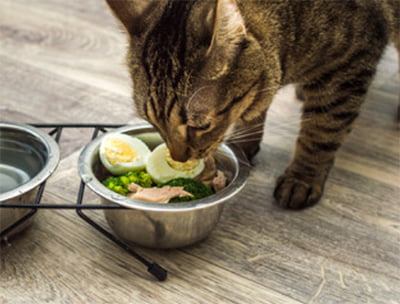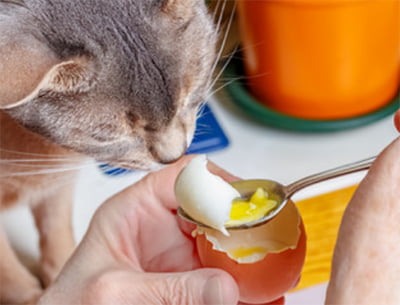Eggs are a favorite food for humans, and they're incredibly nutrient-dense! You may find that your cat also seems to like to sneak eggs. Can cats eat cooked eggs? Are eggs good for cats as well? Should cats eat eggs?
Below, we'll let you know everything about if cats can eat eggs and how to go about feeding eggs to your cat.
Can Cats Eat Eggs?
Yes, cats can eat eggs. Actually, many cat foods contain eggs as an ingredient.
Eggs are actually very healthy for cats if prepared the right way. Cats are obligate carnivores, meaning they must get their nutrition from animal proteins. Eggs, check that box! Some cat breeders will even add eggs to their cat's diet purposefully to give them stronger claws and shinier coats. However, there are a few things you should keep in mind when letting your cats eat eggs.

Health Benefits Of Eating Eggs
Eggs are one of the most nutrient-dense foods available, and cats are also equipped to enjoy these nutrients.
Vitamins
Eggs are high in vitamins A, D, E, and many types of B. These vitamins do many things, such as supporting the nervous, immune, digestive, and circulatory systems, and they support denser bone growth and healthy carbohydrate metabolism. Vitamin D, in particular, is important because cats don't produce this vitamin alone.
Minerals
Zinc, iron, and taurine are found in high amounts in eggs. Zinc increases the skin's health (and, consequently, fur) and supports the reproductive system. Iron is critical for a healthy red blood cell count. Taurine is required for healthy eyes and hearts, and it's critical for cats as they can't produce taurine themselves.
Amino Acids
It's said that eggs are high in protein, and that's true in a way. It might be more accurate to say that eggs are high in amino acids, which are used to make proteins. Cats need eleven essential amino acids, all specific to animal protein, and ten of those are found in eggs.
No Carbs!
Yes, carbohydrates are given a bit of a bad rep lately, but a cat truly doesn't need them. They can't process them in any way. Eggs are completely free of carbohydrates, so they don't gum up a cat's digestive system and allow your pet to access every vitamin and mineral available.

The Downside of Cats Eating Eggs
If eggs are such nutritional powerhouses, why would any pet owner not feed them to their cat? There are a few considerations.
High In Calories, Fat, And Cholesterol
Eggs are rich in more than just proteins, vitamins, and minerals! They are also high in calories, fat, and cholesterol. While an occasional treat of eggs is good for cats, making it a regular thing can lead to obesity and related health issues.
Food Allergies
Eggs are a common food allergy among cats. This doesn't mean you must avoid feeding eggs to your feline friends, but it is wise to introduce eggs slowly and watch for a reaction. Signs of an allergy include itching, ear infections, and upset stomach. Stop and call your veterinarian if you notice any of these signs after feeding your pet eggs.
Health Conditions
Certain health conditions necessitate keeping eggs out of your cat's diet. These include kidney disease, obesity, and pancreatitis.
What Is The Best Way To Feed Your Cat Eggs
The best way to feed your cat eggs is to cook them first! Any form of cooked eggs is fine - scrambled eggs, fried eggs, poached eggs, hard-boiled eggs - they're all fine.
Eggs cooked in butter and oil add too much fat and can increase the likelihood of weight gain. Cooked eggs seasoned with garlic or onions should be avoided, as alums are unsafe for cats to eat.
Frequently Asked Questions
How Much Egg Can A Cat Eat?
When feeding cats eggs, only feed a small amount. Snacks should only make up no more than 10% of your cat's diet, as your cat's main diet should be cat food.
If you are unsure how much to give to your cat, consult with your veterinarian prior to helping you formulate a complete and balanced diet.
Should Cats Eat Raw Eggs?
Cats naturally would eat raw meat frequently, so wouldn't raw or undercooked eggs be just fine? Should cats eat raw eggs or raw egg whites? Not necessarily. For both cats and humans, eggs should be cooked before eating to remove any chance of food poisoning by salmonella. In fact, raw eggs are on the ASPCA's list of human foods pets should avoid.
For pet parents who insist on raw diets for their cats, you can opt to freeze-dry a raw egg and then grind it into a fine powder to sprinkle on top of other foods. Studies have shown that this kills a large percentage of the salmonella bacteria without removing the benefits of raw eggs.
However, eating raw eggs too frequently can cause issues with biotin deficiency. Eggs are rich in biotin, a specific B vitamin, but raw eggs also contain a substance that decreases biotin's absorption, rendering it nearly useless. Cooking eggs negates this substance and allows your cat to absorb the biotin.
Should Cats Eat Egg Yolks?
Eggs are a whole food in and of themselves, but as humans sometimes eat only one part of the egg or the other, cats should as well.
Egg yolks hold most of the egg's calories, fats, and cholesterol. However, the yolks are also where the bulk of the vitamins and minerals are stored as well. Egg whites still contain these nutrients, but not as densely. The whites are, however, still a good source of protein.
For cats with obesity or heart-related concerns, there is a real benefit to separating the egg yolk from the egg whites. Feeding these cats egg whites only helps to boost their protein consumption without worrying about the calories and fat. Studies show that adding a tablespoon of egg white to your cat's normal diet is enough to boost its protein positively.
Can Kittens Eat Eggs?
Yes, kittens can eat eggs. However, they should focus on food and treats that are designed for their life stage to ensure they are getting the nutrition they need to grow.
Can Cats Eat Eggshells?
In theory, yes, eggshells are made of calcium carbonate, making them a great calcium boost for your cat. But most cats won't be interested in eating eggshells.
